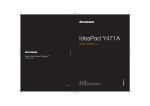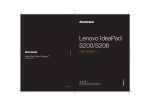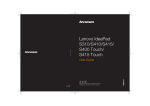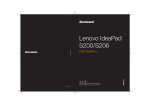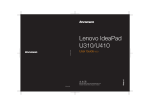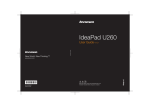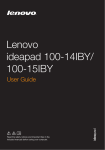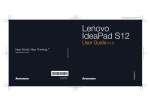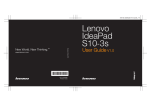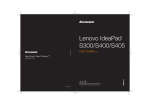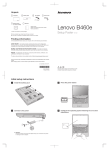Download Lenovo IDEAPAD S100 User's Manual
Transcript
Lenovo IdeaPad S100 User Guide V1.0 ©Lenovo China 2011 V1.0_en-US Read the safety notices and important tips in the included manuals before using your computer. Note • Before using the product, be sure to read Lenovo Safety and General Information Guide first. • Some instructions in this guide may assume that you are using Windows® 7. If you are using other Windows operating system, some operations may be slightly different. If you are using other operating systems, some operations may not apply to you. • The features described in this guide are common to most models. Some features may not be available on your computer and/or your computer may include features that are not described in this user guide. • The illustrations in this manual may differ from the product you are using. Regulatory Notice • To refer to it, go to http://consumersupport.lenovo.com/ and click User guides and manuals. First Edition (January 2011) © Copyright Lenovo 2011. LIMITED AND RESTRICTED RIGHTS NOTICE: If data or software are delivered pursuant a General Services Administration “GSA” contract, use, reproduction, or disclosure is subject to restrictions set forth in Contract No. GS-35F-05925. Contents Chapter 1. Getting to know your computer .......................................... 1 Top view .......................................................................................................................1 Left-side view ..............................................................................................................3 Right-side view............................................................................................................4 Front view ....................................................................................................................4 Bottom view .................................................................................................................5 Chapter 2. Learning the basics.............................................................. 7 First use.........................................................................................................................7 Using AC adapter and battery ..................................................................................9 Using the touchpad...................................................................................................11 Using function keys ..................................................................................................12 Connecting external devices....................................................................................13 System status indicators...........................................................................................17 Using Lenovo Quick Start........................................................................................19 Chapter 3. Connecting to the Internet................................................. 21 Wired connections.....................................................................................................21 Wireless connections.................................................................................................22 Chapter 4. OneKey Rescue system..................................................... 25 OneKey Rescue system ............................................................................................25 Chapter 5. Troubleshooting ................................................................. 29 Frequently asked questions .....................................................................................29 Troubleshooting ........................................................................................................31 Trademarks............................................................................................ 35 i Chapter 1. Getting to know your computer Top view --------------------------------------------------------------------------------------------------- Attention: • Do NOT open the display panel beyond 130 degrees. When closing the display panel, be careful NOT to leave pens or any other objects in between the display panel and the keyboard. Otherwise, the display panel may be damaged. 1 Chapter 1. Getting to know your computer Integrated camera Use the camera for video communication. Built-in microphone The built-in microphone (with noise reduction) can be used for video conferencing, voice narration, or simple audio recordings. Computer display The computer display with LED backlight provides brilliant visual output. QS (Quick Start) button When the computer is powered off, press this button to start Lenovo Quick Start. OneKey Rescue system button When the computer is powered off, press this button to start Lenovo OneKey Rescue system. Note: For details, see “OneKey Rescue system” on page 25. 2 Power button Press this button to turn on the computer. System status indicators For details, see “System status indicators” on page 17. Touchpad The touchpad functions as a conventional mouse. Wireless module antennas The built-in antennas ensure optimal reception of wireless radio. Chapter 1. Getting to know your computer Left-side view -------------------------------------------------------------------------------------- AC power adapter jack Connect the AC adapter here. VGA port Connects to external display devices. Fan louvers Dissipate internal heat. USB port Connects to USB devices. Note: For details, see “Connecting USB devices” on page 14. Combo audio jack Connects to headsets or headphones. Note: The combo audio jack does not support a conventional microphone. Attention: • Listening to music at high volume over extended periods of time may damage your hearing. 3 Chapter 1. Getting to know your computer Right-side view ---------------------------------------------------------------------------------- USB port Connects to USB devices. Note: For details, see “Connecting USB devices” on page 14. RJ-45 port This port connects the computer to an Ethernet network. Note: For details, see “Wired connections” on page 21. Lanyard hole Used for attaching a lanyard (not supplied). Front view ----------------------------------------------------------------------------------------------- Memory card slot Insert memory cards (not supplied) here. Note: For details, see “Using memory cards (not supplied)” on page 13. 4 Chapter 1. Getting to know your computer Bottom view ------------------------------------------------------------------------------------------ Battery latch manual The manual battery latch is used to keep the battery pack secured in place. Battery pack For details, see “Using AC adapter and battery” on page 9. Battery latch spring loaded The spring-loaded battery latch keeps the battery pack secured in place. Speakers The stereo speakers provide rich and powerful sound. 5 Chapter 1. Getting to know your computer 6 Chapter 2. Learning the basics First use ------------------------------------------------------------------------------------------------------ Reading the manuals Read the supplied manuals before using your computer. Connecting to the power The supplied battery pack is not fully charged at purchase. To charge the battery and begin using your computer, insert the battery pack and connect the computer to an electrical outlet. The battery is automatically charged while the computer is running on AC power. Installing the battery pack Refer to the supplied Setup Poster to install the battery pack. Connecting the computer to an electrical outlet 1 Connect the power cord to the AC adapter. 2 Connect the AC adapter to the AC power adapter jack of the computer firmly. 3 Plug the power cord into an electrical outlet. Turning on the computer Press the power button to turn on the computer. Configuring the operating system You may need to configure the operating system when it is first used. The configuration process may include the procedures below. • Accepting the end user license agreement • Configuring the Internet connection • Registering the operating system • Creating a user account 7 Chapter 2. Learning the basics Putting your computer into sleep state or shutting it down When you finish working with your computer, you can put it into sleep state or shut it down. Putting your computer into sleep state If you will be away from your computer for only a short time, put the computer into sleep state. When the computer is in sleep state, you can quickly wake it to resume use, and bypass the startup process. To put the computer into sleep state, do one of the following. • Click and select Sleep from the Start menu. • Press Fn + F1. Note: Wait until the power indicator light starts blinking (indicating that the computer is in sleep state) before you move your computer. Moving your computer while the hard disk is spinning can damage the hard disk, causing loss of data. To wake the computer, do one of the following. • Press the power button. • Press any key on the keyboard. Shutting down your computer If you are not going to use your computer for a day or two, shut it down. To shut down your computer, click and select Shut down from the Start menu. 8 Chapter 2. Learning the basics Using AC adapter and battery --------------------------------------------------------- Checking battery status You can determine the percentage of battery power remaining by checking the battery icon in the notification area. Note: As each computer user has different habits and needs, it is difficult to predict how long a battery charge will last. There are two main factors: • The amount of energy stored in the battery when you commence work. • The way you use your computer: for example, how often you access the hard disk drive and how bright you make the computer display. Charging the battery When you find that the battery power is low, you need to charge the battery or replace it with a fully charged one. You need to charge the battery in any of the following situations: • When you purchase a new battery • If the battery status indicator starts blinking • If the battery has not been used for a long time Note: • You are advised to insert the battery pack when using your computer to prevent small particles from entering the inside of your computer. • To increase the life of the battery pack, the computer does not start recharging the battery immediately after it drops from fully charged. • Charge the battery at a temperature between 50 °F and 86 °F (10 °C-30 °C). • Full charge or discharge is not required. Removing the battery pack If you are not going to use the computer for an extended period of time, or if you need to send your computer to Lenovo for service, etc. remove the battery pack from the computer. Before removing the battery pack, make sure the computer has been shut down. 9 Chapter 2. Learning the basics Handling the battery If the rechargeable battery pack is replaced with an incorrect type, there may be danger of an explosion. The battery pack contains a small amount of harmful substances. To avoid possible injury and detriment to the environment, pay attention to the following points: • Replace only with a battery of the type recommended by Lenovo. • Keep the battery pack away from fire. • Do not expose the battery pack to water or rain. • Do not attempt to disassemble the battery pack. • Do not short-circuit the battery pack. • Keep the battery pack away from children. • Do not put the battery pack in trash that is disposed of in landfills. When disposing of the battery, comply with local ordinances or regulations and your company's safety standards. 10 Chapter 2. Learning the basics Using the touchpad ------------------------------------------------------------------------------- Touchpad To move the cursor on the screen, slide your fingertip on the touchpad in the direction in which you want the cursor to move. Left-/Right-click area The function of the left-/right-click area corresponds to that of the left/right mouse button on a conventional mouse. Note: You can enable/disable the touchpad using Fn + F6. When the touchpad indicator is lit, the touchpad is disabled. 11 Chapter 2. Learning the basics Using function keys Through the use of the function keys, you can change operational features instantly. To use this function, press and hold Fn function keys ; then press one of the . The following describes the features of each function key. 12 Fn + Esc: Turn on/off the integrated camera. Fn + F1: Enter sleep mode. Fn + F2: Turn on/off the backlight of the LCD screen. Fn + F3: Open the interface for the display device switch to select this notebook or an external display. Fn + F5: Open the interface for integrated wireless devices settings (On/Off). Fn + F6: Enable/Disable the touchpad. Fn + F7: Start/Pause playback of Windows Media Player. Fn + F8: Stop playback of Windows Media Player. Fn + F9: Skip to the previous track. Fn + F10: Skip to the next track. Fn + F11: F12 key Fn + PrtSc: Activate the system request. Fn + Pause: Activate the break function. Chapter 2. Learning the basics Fn + Delete: Enable/Disable the scroll lock. Fn + PgUp Home key Fn + PgDn End key Fn + ↑ / ↓: Increase/Decrease display brightness. Fn + → / ←: Increase/Decrease sound volume. Connecting external devices -----------------------------------------------------------Your computer has a wide range of built-in features and connection capabilities. Using memory cards (not supplied) A memory card is a data storage device used for storing digital information that is commonly used in many electronic devices. Your computer is equipped with a memory card reader compatible with the following types of memory cards: • Secure Digital (SD) card • MultiMediaCard (MMC) Your computer can be used to read data from and write data to these types of memory cards. Inserting a memory card You must insert a memory card before you can read data from or write data to it with your computer. To insert a memory card: 1 Align the memory card with the card slot, with the metal contacts facing downwards. 13 Chapter 2. Learning the basics 2 Gently slide the memory card into the card slot until it reaches the end. Note: Insert only one card at a time into the slot. Removing a memory card After reading data from and/or writing data to the memory card, you can remove it from your computer. To remove a memory card: 1 Use the Windows Safely Remove Hardware utility to make sure the card is not in use. 2 Gently pull the memory card out of the card slot. Connecting USB devices You can connect a USB device to your computer by inserting its USB plug (Type A) into the USB port on your computer. The first time you plug a USB device into a particular USB port on your computer, Windows automatically installs a driver for that device. After the 14 Chapter 2. Learning the basics driver is installed, you can disconnect and reconnect the device without performing any additional steps. Note: Typically, Windows detects a new device after connecting it, and then installs the driver automatically. However, some devices may require you to install the driver before connecting. Check the documentation provided by the device's manufacturer before connecting the device. Before disconnecting a USB storage device, make sure your computer has finished transferring data by that device. Click the Safely Remove Hardware icon in the notification area of Windows to remove the device before disconnecting. Note: If your USB device uses a power cord, connect the device to a power source before connecting it. Otherwise, the device may not be recognized. Connecting Bluetooth-enabled devices (on select models) If your computer has an integrated Bluetooth® adapter, it can connect to other Bluetooth-enabled devices, such as notebook computers, PDAs, and mobile phones, and transfer data wirelessly to and from them over a range of up to 10 meters in open areas. Note: The actual maximum range may vary due to interference and transmission barriers. For the best possible connection speed, place the device as near to your computer as possible. Enabling Bluetooth communication on your computerr You must enable Bluetooth communication on your computer before pairing your computer with other Bluetooth-enabled devices. To enable Bluetooth communication on your computer: 1 Press Fn+F5; a list of wireless features will be displayed. 2 Enable Bluetooth communication with a single click. Note: When you do not need Bluetooth communication, disable it to save battery power. Pairing your computer with other Bluetooth-enabled devices The first time you connect your computer to another Bluetooth-enabled device, you must pair the device with your computer as follows: 1 Enable Bluetooth communication on the device and set it to discoverable mode. Note: Read the documentation supplied with the device for details. 15 Chapter 2. Learning the basics 2 Enable Bluetooth communication on your computer. 3 On your computer, go to Control Panel and click Add a device. The device you want to connect to should appear on the device list. Click the device and then click Next. Your computer will generate a pairing code and display it on the screen. 4 On your device, accept the pairing invitation and enter the pairing code displayed on your computer screen. The connection will be established and Windows will automatically install drivers for the device if necessary. Once the connection is established, you can exchange data between your computer and the Bluetooth-enabled device. 16 Chapter 2. Learning the basics System status indicators -------------------------------------------------------------------The system status indicators show the current computer status. The following diagram shows the location of the indicators and the table lists their statuses and meanings. No. Symbol Indicator Power Indicator status Meaning On (solid white) The computer is powered on. Blinking The computer is in sleep mode. Off The computer is powered off. 17 Chapter 2. Learning the basics Battery On (solid white) The battery has more than 20% charge. Solid amber The battery has between 5% and 20% charge. Fast blinking amber The battery has less than 5% charge. Slow blinking amber The battery is being charged. When battery charge reaches 20%, the blinking color changes to white. Slow blinking white The battery has between 20% and 80% charge and is still charging. When the battery reaches 80% charge the light will stop blinking, but charging will continue until the battery is fully charged. Off The battery is detached. Device access Blinking Data is being read from or written to the hard disk drive or other external storage devices. Wireless On Wireless (Bluetooth or wireless network card) is enabled. Off Wireless is disabled. Note: Do not power off the computer or put the computer into sleep (hibernation) mode when the device access indicator is blinking. 18 Chapter 2. Learning the basics Using Lenovo Quick Start -----------------------------------------------------------------With a boot time of just a few seconds, Lenovo Quick Start offers a handy environment that allows you to enjoy instant access to functions such as Web browsing, instant messaging and other entertainment functions without entering the traditional operating system. Note: If Lenovo Quick Start is not installed, a prompt will appear on the screen when you start it. Starting Lenovo Quick Start To start Lenovo Quick Start: 1 Power off the computer. 2 Press the QS button; Lenovo Quick Start will start and be ready to use within a few seconds. Exiting Lenovo Quick Start When you finish using Lenovo Quick Start, you can either power off the computer or start the Windows operating system. To power off the computer, click the Power off button in the lower left hand corner of the screen. To enter Windows, click the Enter OS button in the lower left hand corner of the screen; the computer will restart using the Windows operating system. 19 Chapter 2. Learning the basics 20 Chapter 3. Connecting to the Internet As a global network, the Internet connects computers worldwide, providing services such as sending and receiving e-mail information searching, electronic commerce, Web browsing and entertainment. You can connect the computer to the Internet in the following ways: Wired connections: use physical wiring to connect. Wireless connections: connect through a wireless router. Wired connections -------------------------------------------------------------------------Wired connections are a reliable and safe way to connect the computer to the Internet. Cable Cable Internet services use a cable modem connected to the residential cable TV line. DSL DSL is a family of related technologies that bring highspeed network access to homes and small businesses over ordinary telephone lines. Hardware for wired connections Cable DSL TV cable Splitter * Telephone line Splitter * * * Cable modem * * * Not supplied. DSL modem * * Note: The above diagrams are for reference only. Actual connection method may vary. 21 Chapter 3. Connecting to the Internet Software configuration Consult your Internet Service Provider (ISP) or network administrator for details on how to configure your computer. Wireless connections-------------------------------------------------------------------------Your computer comes with a built-in wireless network card. This allows you to connect to the Internet wirelessly through a wireless network. Note: A wireless network is a computer network which uses wireless routers as access points. Enabling the wireless network card You must enable the wireless network card before connecting to a wireless network. To enable the wireless network card: 1 Press Fn+F5; a list of wireless features will be displayed. 2 Enable wireless network card with a single click. Hardware for wireless connections The Internet Wireless router * * Not supplied Connecting to a wireless network Before connecting to a wireless network, obtain the following information from the network administrator: • The network name (SSID) • The security key Once you get the network name and the security key, you can connect your computer to the wireless network. To connect to the wireless network: 22 Chapter 3. Connecting to the Internet 1 Make sure the wireless network card is enabled and the computer is placed within the coverage range of the wireless network. 2 Go to Control Panel on your computer and click Network and Sharing Center; click Connect to a network to display all wireless networks within range. 3 Select the name of your wireless network and click Connect; enter your security key when prompted. 23 Chapter 3. Connecting to the Internet 24 Chapter 4. OneKey Rescue system OneKey Rescue system --------------------------------------------------------------------- Introduction The Lenovo OneKey Rescue system is an easy-to-use application that can be used to back up the data on your system partition (C drive) for easy restore when required. You can run Lenovo OneKey Recovery under the Windows operating system, and the OneKey Rescue system without starting the Windows operating system. Attention: In order to utilize the features of the OneKey Rescue system, your hard disk already includes a hidden partition by default to store the system image file and OneKey Rescue system program files. This default partition is hidden for security reasons and is the reason the available disk space is less than it claims. The exact available hard disk space depends on the file size of the mirror image file (based on the size of operating system and pre-installed software). Using Lenovo OneKey Recovery (within Windows operating system) In Windows operating system, double click the OneKey Recovery system Icon on the desktop to launch Lenovo OneKey Recovery. Within the program, you can back up the system partition on the hard disk drive, other storage devices, or by creating recovery discs. Note: • The backup process and creation of recovery discs may take some time, connect the AC adapter and battery pack to your computer. • After the recovery discs are burned, please number them so that you can use them in the correct order. • Computers without an integrated optical drive support the creation of recovery discs; however an appropriate external optical drive is needed to physically create the recovery discs. For more instructions, see the Help file of Lenovo OneKey Recovery. 25 Chapter 4. OneKey Rescue system Using Lenovo OneKey Rescue system (without Windows operating system) In the event that the operating system cannot be loaded, follow the steps below to start OneKey Rescue system. • Shut down your computer. • Press the OneKey Rescue system button to start OneKey Rescue system. Within the program, you can choose to restore your system partition to the original factory status, or to a previously generated backup. Note: • The recovery process is irreversible. Make sure to back up any critical data before using the recovery feature. • You can use the tip of an unfolded paper clip (or similar object without a sharp tip) to gently press the OneKey Rescue system button. Creating a recovery disc(s) Your computer does not ship with a recovery disc. You can use Lenovo OneKey Recovery system to create a recovery disc(s), which can be used to start and restore your computer in case of a system failure. To create a recovery disc(s): • Insert a recordable disc into the optical drive on your computer. Note: If your computer does not come with an integrated optical drive or if the integrated optical drive does not support disc creating, connect an appropriate external optical drive to your computer. • In Windows, press the OneKey Rescue system button to launch Lenovo OneKey Recovery system. 26 Chapter 4. OneKey Rescue system • On the main screen, click Create Recovery Disc. • Choose the type of recovery disc(s). You can create three types of recovery disc(s): recovery disc(s) with existing backup image, recovery disc(s) from the current system partition, and factory default recovery disc(s). Select the type of recovery disc you want to create and follow the on-screen instructions. • Insert additional recordable disc(s) when prompted. Note: • The estimated number of discs needed will be displayed before the process of creating the recovery disc(s) begins. To minimize the number of discs needed, use recordable DVDs as the media. Also make sure your optical drive is compatible with the disc intended for use. • After recovery disc creation, number the discs appropriately for use in their correct order. The first disc created will be used to start the computer in the case of a system failure. 27 Chapter 4. OneKey Rescue system 28 Chapter 5. Troubleshooting Frequently asked questions ------------------------------------------------------------This section lists frequently asked questions and tells where you can find detailed answers. What safety precautions should I follow when using my computer? See “Chapter 1. Important safety information” of Lenovo Safety and General Information Guide. How can I prevent problems with my computer? See “Chapter 2. Use and care Information” of Lenovo Safety and General Information Guide. What are the main hardware features of my computer? More information can be found in Chapter 1 and 2. Where can I find the detailed specifications for my computer? See http://consumersupport.lenovo.com. Where are the recovery discs? Your computer did not come with a recovery disc. For an explanation of the alternative recovery methods offered by Lenovo, see “Chapter 4. OneKey Rescue system” on page 25. Where are the installation discs for preinstalled programs? Installation discs for preinstalled programs are not supplied with Windows preinstalled computers. You can visit the Lenovo consumer support Web site to find all preinstalled software downloads. By default, you can find some installation backups for certain preinstalled software in the APP folder under the D driver. How can I contact the customer support center? See " Chapter 3. Getting help and service" of Lenovo Safety and General Information Guide. Where can I find warranty information? For the warranty applicable to your computer, including the warranty period and type of warranty service, see the Lenovo limited warranty flyer that came with your computer. 29 Chapter 5. Troubleshooting How can I install the device drivers? A compatible device driver is a requirement to ensure correct operation and performance of each component in your computer. If your computer is pre-installed with an operating system, Lenovo provides all drivers that you need in your hard disk. What can I do if the backup process fails? If you can start the backup feature without a problem, but it fails during the backup process, please try the following steps: 1 Close other programs, then restart the backup process. 2 Check if the destination media is damaged, try to select another path and then try again. When do I need to restore the system to the factory status? You can use this recovery feature when your system fails or you need to reinstall your operating system. This will restore your computer back to the initial status when you first booted up your computer after receiving it from the store. If there is critical data on your current partition, back it up before you run this recovery feature. 30 Chapter 5. Troubleshooting Troubleshooting -------------------------------------------------------------------------------------If you do not find your problem here, see Chapter 2. The following section only describes problems that might negate the need to refer to the more comprehensive information in Chapter 2. Display problems When I turn on the computer, nothing appears on the screen. • • If the screen is blank, make sure that: - The battery is installed correctly. - The AC adapter is connected to the computer and the power cord is plugged into a working electrical outlet. - The computer power is on. (Press the power button again for confirmation.) - The memory is installed correctly. If these items are properly set, and the screen remains blank, have the computer serviced. When I turn on the computer, only a white cursor appears on a blank screen. • Restore backed-up files to your Windows environment or the entire contents of your hard disk to the original factory contents using OneKey Rescue system. If you still see only the cursor on the screen, have the computer serviced. My screen goes blank while the computer is on. • Your screen saver or power management may be enabled. Do one of the following to exit from the screen saver or to resume from sleep or hibernation mode: - Touch the touchpad. - Press any key on the keyboard. - Press the power button. - Press Fn + F2 to confirm whether the backlight for the LCD screen has been turned off. 31 Chapter 5. Troubleshooting Password problems I forgot my password. • • • If you forget your user password, you must take your computer to a Lenovo authorized servicer or a marketing representative to have the password changed. If you forget your HDD password, a Lenovo authorized servicer cannot reset your password or recover data from the hard disk. You must take your computer to a Lenovo authorized servicer or a marketing representative to have the hard disk drive replaced. Proof of purchase is required, and a fee will be charged for parts and service. If you forget your supervisor password, a Lenovo authorized servicer cannot reset your password. You must take your computer to a Lenovo authorized servicer or a marketing representative to have the system board replaced. Proof of purchase is required, and a fee will be charged for parts and service. Sleep or hibernation problems The critical low-battery error message appears, and the computer immediately turns off. • The battery power is getting low. Connect the AC adapter to the computer, or replace the battery with a fully charged one. The computer enters sleep mode immediately after Poweron self-test (POST). • Make sure that: - The battery is charged. - The operating temperature is within the acceptable range. See “Chapter 2. Use and care Information” of Lenovo Safety and General Information Guide. Note:If the battery is charged and the temperature is within range, have the computer serviced. The computer does not return from sleep mode and the computer does not work. • • • If the computer does not return from sleep mode, it may have entered hibernation mode automatically because the battery is depleted. Check the power indicator. If your computer is in sleep mode, connect the AC adapter to the computer, then press any key or the power button. If your computer is in hibernation mode or power-off state, connect the AC adapter to the computer, then press the power button to resume operation. Note: If the system still does not return from sleep mode, your system has stopped responding, and you cannot turn off the computer; reset the computer. Unsaved data may be lost. To reset the computer, press and hold the power button for 4 seconds or more. If the computer is still not reset, remove the AC adapter and the battery. 32 Chapter 5. Troubleshooting Computer screen problems The screen is blank. • Do the following: - If you are using the AC adapter, or using the battery, and the battery status indicator is on, press Fn + ↑ to make the screen brighter. - If the power indicator is in blinking, press the power button to resume from the sleep mode. - If the problem persist, follow the solution in the following problem “The screen is unreadable or distorted.” - Press Fn + F2 to confirm whether the LCD screen has been turned off. The screen is unreadable or distorted. • Make sure that: - The display device driver is installed correctly. - The screen resolution and color quality are correctly set. - The monitor type is correct. Incorrect characters appear on the screen. • Did you install the operating system or programs correctly? If they are installed and configured correctly, have the computer serviced. • Make sure that: - The Mute function is off. - The headphone jack is not used. - Speakers are selected as the playback device. Your computer shuts down before the battery status indicator shows empty. -orYour computer operates after the battery status indicator shows empty. • Discharge and recharge the battery. The computer does not operate with a fully charged battery. • The surge protector in the battery might be active. Turn off the computer for one minute to reset the protector; then turn on the computer again. • In the Boot menu in BIOS setup utility, make sure that the hard disk drive is included in the Boot priority order correctly. Sound problems No sound can be heard from the speaker even when the volume is turned up. Battery problems A hard disk drive problem The hard disk drive does not work. 33 Chapter 5. Troubleshooting A startup problem The Microsoft® Windows operating system does not start. • Use the OneKey Rescue system to help solve or identify your problem. For details about OneKey Rescue system, see “Chapter 4. OneKey Rescue system” on page 25. OneKey Rescue system problems Backup cannot be made. • • You are not currently using a Windows operating system. There is not enough space to store the backed up data. You will need to free more hard disk space on your system partition (C drive). Fail to restore system partition to factory default. • The system partition, such as the partition size or the drive capacity of C, has been modified. • To turn off your computer, press and hold the power button for 4 seconds or more. If the computer still does not respond, remove the AC adapter and the battery. Your computer might lock when it enters sleep mode during a communication operation. Disable the sleep timer when you are working on the network. Other problems Your computer does not respond. • The computer does not start from a device you want. • • • The connected external device does not work. • • 34 See the Boot menu of the BIOS setup utility. Make sure that the Boot priority order in the BIOS setup utility is set so that the computer starts from the device you want. Also make sure that the device from which the computer starts is enabled. In the Boot menu in the BIOS setup utility, make sure that the device is included in the Boot priority order list. Press F12 when the Lenovo logo appears on the screen while the computer is starting up to select the device you want the computer starts from. Do not connect or disconnect any external device cables other than USB while the computer power is on; otherwise, you might damage your computer. When using a high power consumption external devices such as an external USB optical disk drive, use external device power adapter. Otherwise, the device may not be recognized, or system shut down may result. Trademarks The following terms are trademarks or registered trademarks of Lenovo in the United States, other countries, or both. Lenovo IdeaPad OneKey Microsoft and Windows are trademarks of Microsoft Corporation in the United States, other countries, or both. Other company, products, or service names may be trademarks or service marks of others. 35 Note • Before using the product, be sure to read Lenovo Safety and General Information Guide first. • Some instructions in this guide may assume that you are using Windows® 7. If you are using other Windows operating system, some operations may be slightly different. If you are using other operating systems, some operations may not apply to you. • The features described in this guide are common to most models. Some features may not be available on your computer and/or your computer may include features that are not described in this user guide. • The illustrations in this manual may differ from the product you are using. Regulatory Notice • To refer to it, go to http://consumersupport.lenovo.com/ and click User guides and manuals. First Edition (January 2011) © Copyright Lenovo 2011. LIMITED AND RESTRICTED RIGHTS NOTICE: If data or software are delivered pursuant a General Services Administration “GSA” contract, use, reproduction, or disclosure is subject to restrictions set forth in Contract No. GS-35F-05925. Lenovo IdeaPad S100 User Guide V1.0 ©Lenovo China 2011 V1.1_en-US Read the safety notices and important tips in the included manuals before using your computer.









































